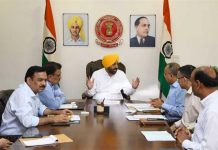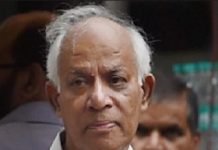By Aastha Atray Banan

Photo: Indiaevm.Org
IS TECHNOLOGIST Hari Prasad a reformer or a thief? Prasad, a technical coordinator with VeTA (Verifiability, Transparency and Accountability) had recently co-authored a paper questioning claims that Indian electronic voting machines (EVMs) were fully secure. VeTA is a citizens forum that deals with election-related issues.
After an EVM went missing from the Mumbai Collector’s office, where the machines are stored, police claimed it was the one Prasad had used for a televised demonstration earlier this year — showing how the EVMs could be tampered with. In India, they are manufactured by two state-owned companies. The one Prasad is alleged to have stolen was made by the Electronics Corporation of India.
Prasad told interrogators that it was a government official who gave him the EVM; that it was returned; but he cannot recall whom he got it from.
While chief investigative officer API Ravindra Wani claims that his team is looking into “all possibilities”, Prasad’s advocate, M Kalyana Rama Krishna, is convinced that his client, who was arrested from his Hyderabad home on 21 August, is being framed.
“Last month, he was summoned by the Mumbai Police to appear as a witness, in case he was acquainted with the facts,” Krishna says. “But he could not make it, because that same day (10 July) he had a meeting with Chief Election Commissioner (CEC) SY Qureshi. So I sent a telegram to the police. Prasad had then told me that the CEC had promised to take action regarding the EVMs.
“But on 14 August, while he was attending to a sick relative in Visakhapatnam, he got a second summon asking him to appear as a witness. We sent another telegram with his tickets attached, days after which he was arrested.”
Krishna’s argument is: Had Prasad really been guilty, would he have gone to meet Qureshi? And would not the CEC have ordered his arrest? His petition will press the point once Prasad completes his police remand on 26 August.
MUMBAI IS rife with rumours of a frameup, with VeTA having the silent backing of the media and advocacy groups. According to Prasad’s video — made in collaboration with researchers from the University of Michigan — Indian EVMs are vulnerable in two ways. First, by replacing a certain part of the machine, it was possible to programme it for stealing votes to favour a particular candidate; and the instruction to steal could even be sent from a mobile phone. Then again, hackers could use a pocket-size device to alter the number of votes stored in an EVM between the polling and the counting of votes — which in India can take weeks.
Opposition parties, including the BJP and the Left, had raised fears of EVMs being susceptible to hacking. But the then CEC, Navin Chawla, dismissed the claims saying private manufacturers, who had failed to sell their machines, were behind the propaganda.
Says VV Rao, VeTA’s national coordinator and the main petitioner in the Supreme Court against the use of EVMs: “After conducting surveys in eight states, I had listed the various problems plaguing the EVMs, of which Prasad and his team gave a practical demonstration.” Although the EC challenged their findings, and came out in support of the manufacturers — who slapped a case on VeTA that has since been withdrawn — the watchdog has continued with its mission.
aastha@tehelka.com













